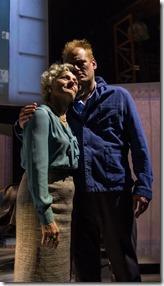
Patchy, poetic, perverse - new adaptation is nothing if not audacious
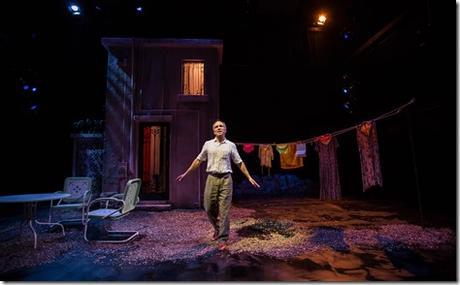
Any discussion of the epic new 2666 begins-and for many, instantly ends-with its length. Five and a half hours is a lot to ask for the most ardent lover of theatre, let alone a casual attendee. Even with three intermissions, that's a long time to go subsisting just on what you thought to bring in and Goodman's concessions.
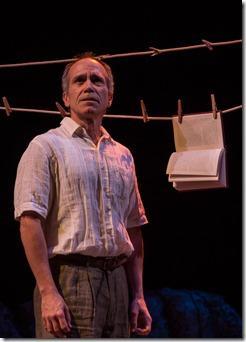
Just the story of how Roberto Bolaño's massive-yet-still-unfinished book was adapted by Goodman's artistic director Robert Falls over ten years could be the subject of a documentary. It's the first of the Roy Cockrum funded works, the monk turned Powerball winning theatre patron. As a finished product, is an indulgent, sprawling toolbox of theatrical devices desperately trying to mimic the source's erratic tone.
To summarize the plot will be nearly as epic, but here goes:
Part I: The Part About the Academics.A conference is convened to discuss the Nobel-worthy works of 'Benno von Archimboldi'. Three academics, Piero (Sean Fortunato), Jean-Claude (Lawrence Grimm) and Manuel (Demetrios Troy) are thrown for a loop by the introduction of a comely young prodigy, Liz (Nicole Wiesner).
The quartet of Archimboldists become obsessed with the thought of meeting their mysterious, hermetic messiah. As they begin waiting for Godot, er, searching for Archimboldi, they develop a love triangle only possible amongst people who are too self-absorbed to truly love. Even though they are warned that author's devour their explorers, they remain almost insatiable in their desire on a frequently thwarted quest. They travel to Santa Teresa, Mexico and stumble into a surreal town that appears to be a machine to murder women.
Part II: The Part About AmalfitanoÓscars Amalfitano (Henry Godinez), a philosophy professor who helped our intrepid academics in Part 1, worries about his party-hungry daughter Rosa (Alejandra Escalante). He hears his father's voice in the wind mocking him. His wife and Rosa's mother (Charin Alvarez) went mad and left, presumably having caught madness from her husband like some kind of telepathic STD (the source is left to our imagination. Patient Zero may be existence itself). He must be mad to keep a vulnerable 17 year old girl in a place that is the manifestation of a death wish. Perhaps his madness is setting him free?
Part III: The Part About FateWe meet another Oscar, last name Fate (Eric Lynch) in section three. 'Oscar' in this context probably means 'warrior'-make of that what you will. A journalist for an African American magazine in NYC, he's been sent to Santa Teresa to cover a boxing match. He encounters Chucho (Demetrios Troy), another journalist, and learns of the terrible plague of female murders and the supposed culprit, Klaus (Mark L. Montgomery).
His editor turns down the opportunity to follow up on the murder story but fate (the narrative force, not himself) has other plans. At the match he meets Rosa and-following an incident that takes place mostly in film by Shawn Sagady-gets back to Professor Amalfitano, who has an important request/quest for the would-be knight. Before he executes it, there's an important visit to make (dot dot dot). Like Goya's Colossus, we are told a giant is coming.
Here the details of the known 112 (and probably more) murders of the fictional Santa Teresa between 1993 and 1997 are dissected through the lens of the local police force. Teresa's corollaries to its real life inspiration-Ciudad Juárez-are laid bare. A naked woman in the desert provides the backdrop to the grotesquely misogynistic police force as they run afoul of powerful behind-the-scenes players who want to thwart anyone from delving too deep into the mystery. A psychiatrist in charge of the insane asylum (Janet Ulrich Brooks) and a younger cop (Juan Francisco Villa) strike up a relationship that delves into the long term trend of machismo and gynophobia that pervades Mexico (and many would say, the world).
Part V: The Part About ArchimboldiIn this section, Falls and Bockley's adaptation takes on a mytho-poetic tone with magical Tim Burtonesque styling akin to the fairy tale tone of the source. As the title states, it delves back into the past to 1920's Prussia where the life of Archimboldi begins. It then traces his path through the 20th century. In doing so it draws out the most thematic overtones of the work. To say more would be a disservice to the production, as everything here draws the previous four-plus hours together even as it expands and condenses the scope. Parallels and contradictions, overly-tidy bookending and confounding spin offs in would fill up another article, but this part is the most successful at creating that sense of foreboding and dread that snowballs throughout the novel.
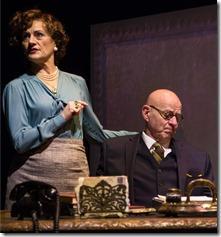
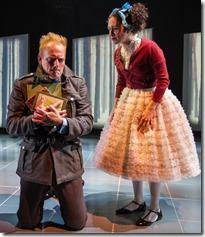
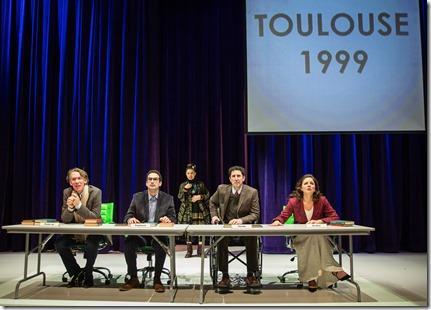
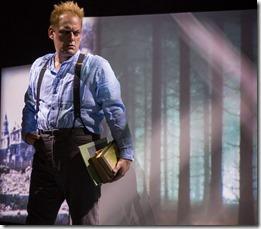
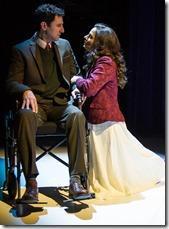
"Madness is contagious" is a running theme (and technically true for us urbanites) in and must have been behind the scenes as well. It takes a certain madness to create such a work, or at least a willingness to rebuff the rules. There's no denying that, love it or hate it, this took a crazy amount of passion and devotion functioning at every level. Still, even Lookingglass' 2008 adaptation of the equally epic The Brothers Karamazov knew that they had to keep the production at less than four hours.
All the talk of audience's temporal endurance aside, does it work? The short answer is: intermittently.
One of the most withering criticisms is the one that can be levied at the most prominent device utilized throughout. The sheer amount of story-style theatre involving actors standing and telling us what they are feeling/have done/key facts/etc. makes one wonder if this is in fact Chicago theatre's first foray into a live action book on tape. At times this is irritating (Part 1) and other times numbing (the elucidation of the facts about dead girls in Part 4, lifted directly from the text).
Another issue that runs in any adaptation is one I learned well in art school, "The medium *is* the message". the play runs a full gamut of theatrical styles. Part 1 starts serious but turns the academics into absurd navel gazing denizens of Balnibarbi. Part 3 has the feel of film noir, not the least of which because an entire screen drops down and shows us a (very well crafted and directed) movie for about a third of its runtime. Messages have a way of being made more blatant when translating from one medium to the next and this is wincingly clear here ("They take an idea, bowdlerize it, blow it up..." said famous anti-adaptationist Alan Moore in reference to his graphic novels being adapted to film.) Falls has matched Bolaño's eclecticism style for style, but the hyper-verbatim translation loses subtlety when Falls is so beholden to the source. He has cut a lot, but there might have been more to pare. One is forced to wonder what Bolaño would have added had he finished his magnum opus (was published posthumously in 2004). That's a massive problem because in -and in most epic works for that matter-the digressions are the point, the "fabric of the particular" in Bolaño's words.
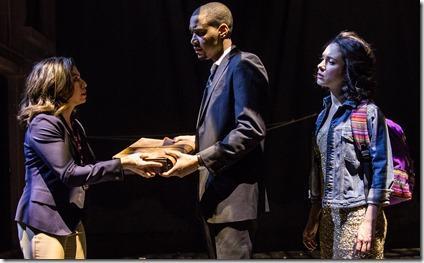
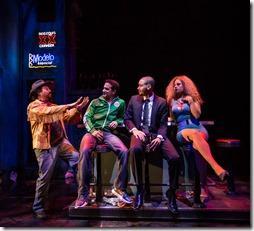
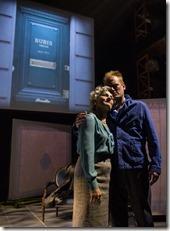
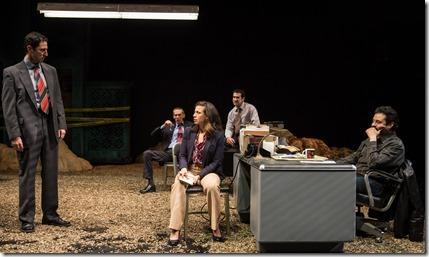
This is a work on par with adapting "Don Quixote," a book which features prominently as a novel "no one finishes" in Part 2. I've heard tales told from later showings that many people couldn't return from intermission and this would appear to be an embedded easter egg saying "If you don't have the tenacity to finish this, this wasn't for you" (no refunds?). Stumblings may have been inherent from the beginning because this is not a theatrically disposed work with its discursive plots and mystery motifs. Falls walks a tightrope of his own making, and with the Cockrum endowment infusing it, it's unclear that this was intended to turn a profit or to stand alone as a work of avant garde staging for its own sake that will be a benchmark in Chicago theatre.
One thing everyone can and should agree on is everything surrounding the adaptation. Brilliant scenic design by Walt Spangler, impeccable costuming by Ana Kuzmanic, and some of the most inventive use of projections anywhere by Shawn Sagady. The fifteen person cast playing multiple roles is evenly dedicated across the board, even as the unevenness and speed keeps us from really identifying with any single character.
At this point, however, criticism is almost unnecessary. This is the kind of work that will spur more discussions than probably any other production on Chicago stages this year. Goodman extended the run before any word on the quality had been released. Two and a half stars has never been more true than with this recommendation: you might like it.
Robert Falls chased his author and was devoured, just as predicted. That may be the point.
continues through March 13th March 20th at Goodman Theatre, 170 N. Dearborn (map), with performances Wednesdays-Saturdays at 6:30pm, Sundays 1pm. Tickets are $20-$45, and are available by phone (312-443-3800) or online through their website (check for half-price tickets at Goldstar.com ). More information at GoodmanTheatre.org. (Running time: 5 hours 30 minutes, includes 3 intermissions)
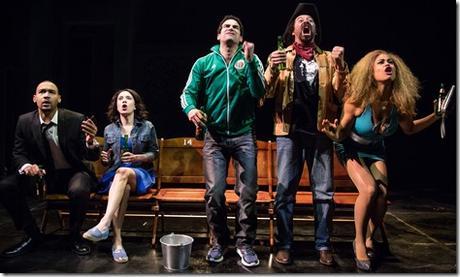
Photos by Liz Lauren
behind the scenes
Tags: 16-0239, 2666, Aaron Spivey, Adam Belcuore, Adam Poss, Alden Vasquez, Alejandra Escalante, Ana Kuzmanic, Charin Alvarez, Chicago Theater, Chuck Coyl, Clint May, Demetrios Troy, Eric Lynch, Erica Sartini-Combs, Eva Breneman, Goodman Theatre, Henry Godinez, Janet Ulrich Brooks, Jonathan Weir, Joseph Drummond, Juan Francisco Villa, Larry Grimm, Liz Lauren, Mark L. Montgomery, Mikhail Fiksel, Neena Arndt, Nicole Wiesner, post, Richard Woodbury, Robert Falls, Roberto Bolaño, Roy Cockrum, Sandra Delgado, Sean Fortunato, Seth Bockley, Shawn Sagady, Tanya Palmer, Walt Spangler, Yadira Correa

